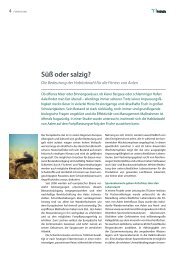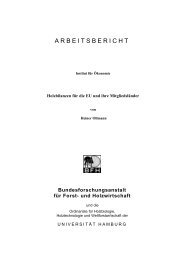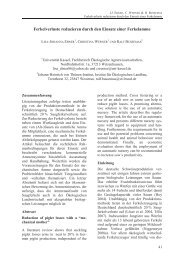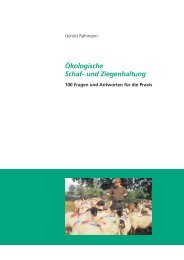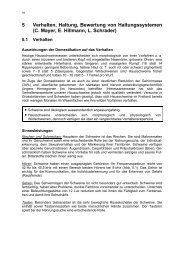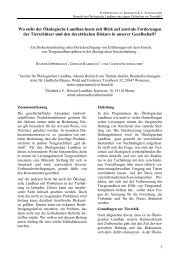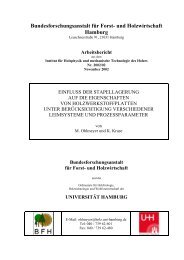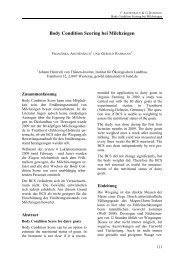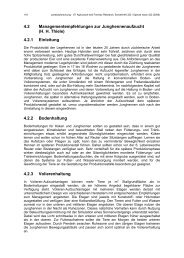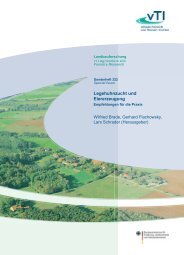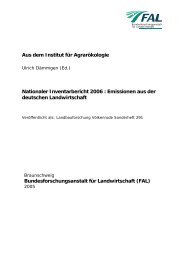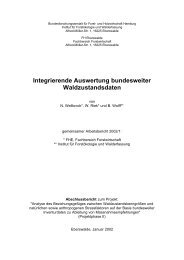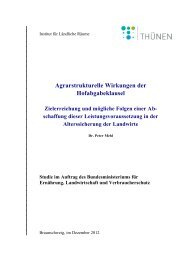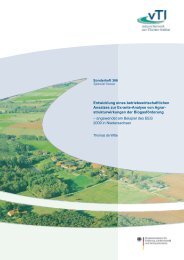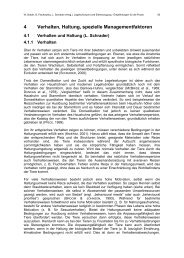- Page 1 and 2: Sonderheft 350 Special Issue COST A
- Page 3 and 4: Landbauforschung vTI Agriculture an
- Page 5: COST Action E52 Genetic resources o
- Page 8 and 9: Ernő Führer - Csaba Mátyás - Gy
- Page 10 and 11: Genetic resources of beech in Europ
- Page 13 and 14: The sTaTus oF euroPeaN beech (Fagus
- Page 15 and 16: • Beech (Fagus), 19 ,093 ha; with
- Page 17 and 18: Fig. 3: Mixed forest of European be
- Page 19 and 20: TreaTmeNT oF beech In forest with a
- Page 21 and 22: Tab. 2: E. beech Nature Reserve Int
- Page 23 and 24: Tab. 4: Percentage of defoliation a
- Page 25 and 26: “Qaf Shtame” national park, in
- Page 27 and 28: Qiriazi P., Sala S., 2006. Nature M
- Page 29 and 30: Armenia is characterized by a mount
- Page 31 and 32: Fig. 3: Leaves of oriental beech (h
- Page 33 and 34: The Georgian oak forests prefer the
- Page 35 and 36: Fig. 5: Map of oriental beech distr
- Page 37 and 38: PesTs, dIseases aNd abIoTIc ImPacTs
- Page 39 and 40: Khanjyan N. 2004. Specially protect
- Page 41: was reported by Polaczek (1954) who
- Page 45 and 46: Tab. 2: Compilation of different as
- Page 47 and 48: Schadauer K., Büchsenmeister R., S
- Page 49 and 50: Fig. 1: Provenances regions in Belg
- Page 51 and 52: Fig. 3: Regenerated stand by clumps
- Page 53 and 54: eFereNces 1 http://environnement.wa
- Page 55 and 56: Fig. 1: Distribution of European be
- Page 57 and 58: activities already during medieval
- Page 59 and 60: established aimed at seed productio
- Page 61 and 62: Fig. 4: Sub-Mediterranean type of d
- Page 63 and 64: CURRENT STATE OF EUROPEAN BEECH (FA
- Page 65 and 66: Fig. 2: Map of natural range of Fag
- Page 67 and 68: The health status of beech forests
- Page 69 and 70: Under the auspices of the Internati
- Page 71 and 72: Velinova K., Naydenova T., Dakov A.
- Page 73 and 74: the Adriatic coast, while in the co
- Page 75 and 76: Fig. 1: Provenace regions and seed
- Page 77 and 78: Fig. 2: International beech provena
- Page 79 and 80: Official Gazette NN 140/05, 2005: Z
- Page 81 and 82: European beech is distributed almos
- Page 83 and 84: According to the Report about fores
- Page 85 and 86: The most important ex situ conserva
- Page 87 and 88: eFereNces Čermák K., Hofman J., K
- Page 89 and 90: Zpráva o stavu lesa a lesního hos
- Page 91 and 92: ForesT maNaGemeNT European beech in
- Page 93 and 94:
euroPeaN beech (Fagus sylvatica L.)
- Page 95 and 96:
GeNeTIc resources maNaGemeNT IN Fra
- Page 97 and 98:
Fig. 2: Beech provenance region lim
- Page 99 and 100:
eFereNces Anonymous 2008. Cours des
- Page 101 and 102:
of Georgia up to 00 - 800 m a.s.l.
- Page 103 and 104:
5,0% 5,0% 6,9% 6,9% 0,6% 0 0,6% 4,7
- Page 105 and 106:
Georgia 52 associations (forest typ
- Page 107 and 108:
- Matured and over-aged groups acco
- Page 109 and 110:
Fig. 5. Scheme of structure at heig
- Page 111 and 112:
curreNT GeNeTIc coNservaTIoN acTIvI
- Page 113 and 114:
• Elaborating and implementation
- Page 115 and 116:
curreNT sTaTe oF euroPeaN beech (Fa
- Page 117 and 118:
other forest species or grassland.
- Page 119 and 120:
Fig. 1: The 26 regions of provenanc
- Page 121 and 122:
the earnings for the forest owner f
- Page 123 and 124:
Küster H. 1998. Geschichte des Wal
- Page 125 and 126:
have had human assistance in this c
- Page 127 and 128:
elow 300 m a. s. l. The species has
- Page 129 and 130:
Tab. 2: Age class distribution of t
- Page 131 and 132:
with the intention that stands woul
- Page 133 and 134:
Tab. 3: European-level beech woodla
- Page 135 and 136:
Sourcing of forest reproductive mat
- Page 137 and 138:
Recently the four British Regions o
- Page 139 and 140:
defoliation, and in severe cases, s
- Page 141 and 142:
Herbert R., Samuel S., Patterson G.
- Page 143 and 144:
curreNT sTaTus oF GeNeTIc resources
- Page 145 and 146:
Fagetalia (Fagetum) Abietion cephal
- Page 147 and 148:
Regions of provenances: The whole c
- Page 149 and 150:
sILvIcuLTure, reGeNeraTIoN, ForesT
- Page 151 and 152:
decidua), oaks (Quercus spp.) or no
- Page 153 and 154:
Spanos K. A., Trakolis D., Spanos I
- Page 155 and 156:
elevation where beech occurs is ext
- Page 157 and 158:
Fig. 2: Climatic envelope of beech
- Page 159 and 160:
eGIsTered sources oF reProducTIve m
- Page 161 and 162:
maIN beech dIseases aNd PesTs Europ
- Page 163 and 164:
In the field of forest genetic rese
- Page 165 and 166:
Mátyás V. 1969. Influence des con
- Page 167 and 168:
A recent inventory of all forest la
- Page 169 and 170:
Photo 1: Stand of beech in Kilbora
- Page 171 and 172:
In 1995 and again in 1998 Ireland p
- Page 173 and 174:
GeNeTIc resources oF beech IN ITaLy
- Page 175 and 176:
Provenance studies revealed differe
- Page 177 and 178:
GeNeTIc resources aNd reProducTIve
- Page 179 and 180:
A very peculiarly feature of this b
- Page 181 and 182:
absTracT curreNT sTaTe oF euroPeaN
- Page 183 and 184:
Natural distribution of Fagus sylva
- Page 185 and 186:
de Vries S. M. G. 1998a. Activities
- Page 187 and 188:
Fig. 1: Natural distribution of Eur
- Page 189 and 190:
a long enough period for regenerati
- Page 191 and 192:
Gömöry D., Paule L., Schvadchak M
- Page 193 and 194:
GeNeTIc resources oF beech (Fagus s
- Page 195 and 196:
Fig. 2: The protected area of “Ca
- Page 197 and 198:
Monotropa hypopitis. Most of these
- Page 199 and 200:
coNservaTIoN aNd raTIoNaL uTILIZaTI
- Page 201 and 202:
eFereNces Andreev V. N. 195 . Derev
- Page 203 and 204:
curreNT sTaTe oF euroPeaN beech (Fa
- Page 205 and 206:
Dumitreşti, Dobra, Voineşti, Bâr
- Page 207 and 208:
centre of Poland. The highest value
- Page 209 and 210:
Chira D., Dănescu F., Geambaşu N.
- Page 211 and 212:
*** 2008. Legea nr. 46/2008: Codul
- Page 213 and 214:
and/or Eastern beech. For most char
- Page 215 and 216:
dIsTrIbuTIoN, ForesT commuNITIes aN
- Page 217 and 218:
(Willd. ex Fr.) Karst., Fomitopsis
- Page 219 and 220:
eFereNces Becker M. 1981. Taxonomie
- Page 221 and 222:
Society of Geneticists of Serbia an
- Page 223 and 224:
Because of its high share in the tr
- Page 225 and 226:
purposes is allowed to be procured
- Page 227 and 228:
absTracT curreNT sTaTe oF euroPeaN
- Page 229 and 230:
the Sub-Mediterranean and in the hi
- Page 231 and 232:
euroPeaN beech GeNe PooL PreservaTI
- Page 233 and 234:
eech domINaTed ForesT soIL ecosysTe
- Page 235 and 236:
Culiberg M. 1994. Dezertifikacija i
- Page 237 and 238:
Šercelj A. 1996. Začetki in razvo
- Page 239 and 240:
1 2 Region of provenance Altitude (
- Page 241 and 242:
sILvIcuLTure aNd ForesT maNaGemeNT
- Page 243 and 244:
Ibáñez J. I. 1989. El haya (Fagus
- Page 245 and 246:
GeNeraL INFormaTIoN abouT beech IN
- Page 247 and 248:
Cheaper and better ways to regenera
- Page 249 and 250:
climate on forests and implications
- Page 251 and 252:
ecoLoGy aNd dIsTrIbuTIoN oF beech I
- Page 253 and 254:
Fig. 2: Map of the Swiss provenance
- Page 255 and 256:
eech uNder chaNGING eNvIroNmeNTaL F
- Page 257 and 258:
e52/wuehlisch.pdf Zimmermann N. E.,
- Page 259 and 260:
egions reach down to the Murat Moun
- Page 261 and 262:
characTerIsTIcs aNd ForesT maNaGeme
- Page 263 and 264:
Wide distribution of oriental beech
- Page 265 and 266:
zones and marginal populations and
- Page 267 and 268:
euroPeaN beech (Fagus sylvatica L.)
- Page 269 and 270:
On the eastern limit, beech occurs
- Page 271 and 272:
of felling area only, whereas the r
- Page 273 and 274:
sylvatica L. на північно-
- Page 275 and 276:
Reviewers Directory Prof. alexander
- Page 277:
dr. eduardo Notivol C.I.T.A. - Gove
- Page 280:
334 Hans-Dieter Haenel (Hrsg.) (201



